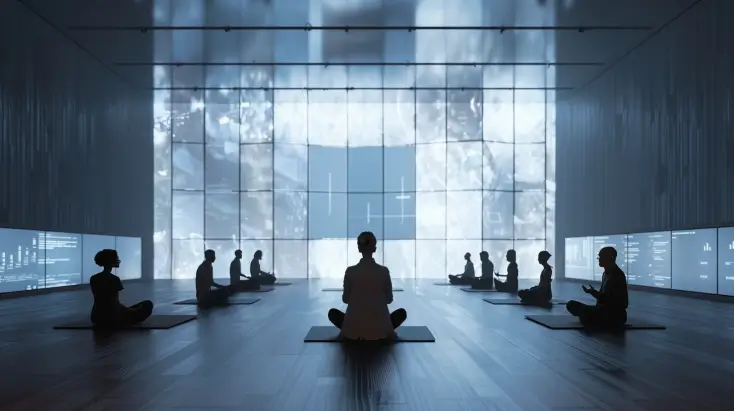Introduction

Meditation, an ancient practice revered for its profound impact on the mind and spirit, has entered a new era, merging with the pulse of modern technology. Imagine integrating the timeless wisdom of meditation with the precision of today’s artificial intelligence (AI). This synthesis is not just happening—it’s reshaping how we understand and enhance our inner lives.
In 2022, the use of AI in wellness apps surged by over 40%, signaling a pivotal shift in how individuals engage with self-care technologies. This isn’t just about numbers; it’s about the real, transformative experiences people like you are having every day. Picture a scenario where your meditation session is guided by an AI, perfectly attuned to your emotional state and designed to adapt in real-time, offering you a deeply personalized path to tranquility.
As you read this article, you’ll explore how this innovative blend of ancient practice and cutting-edge technology isn’t just a novelty—it’s becoming a vital tool in achieving mental clarity and emotional balance. We’ll delve into the origins of meditation, trace its evolution through centuries, and reveal how AI is setting the stage for a future where meditation is more accessible, effective, and deeply integrated into our daily lives. Join us on a journey where tradition meets technological innovation, and discover how advanced AI-supported meditation can elevate your practice to unprecedented levels.
Meditation Is Easier Than You Think
The Evolution of Meditation Practices


Meditation, a practice deeply rooted in the ancient spiritual rituals of Eastern civilizations, has evolved into a globally embraced tool for enhancing mental and spiritual well-being. Initially confined to the secluded monasteries and spiritual circles of India and China, meditation involved intricate practices aimed at achieving profound inner peace and enlightenment. Over the centuries, as travelers and scholars began to explore these eastern traditions, meditation gradually spread across the world, morphing into various forms that catered to different cultural understandings and spiritual needs.
The 20th century marked a significant turning point when meditation transitioned from a primarily spiritual exercise into a popular health and wellness activity. This shift was further fueled by scientific research that began to document the numerous health benefits of meditation, such as stress reduction, improved concentration, and overall well-being, making it appealing to a broader, more secular audience. As meditation’s popularity surged, it became a tool not just for spiritual seekers but for anyone aiming to enhance their quality of life.
Entering the 21st century, the digital revolution began to reshape countless aspects of daily life, including how we meditate. Technological advancements have significantly democratized and expanded access to meditation practices. Mobile apps, virtual reality (VR) systems, and biofeedback devices now offer personalized meditation experiences that were once unimaginable. These technologies have not only modernized meditation practices but have also made them more accessible, allowing individuals to engage in meditation sessions that are tailored to their specific emotional and physiological states.
Consider the potential of a VR meditation session that transports you to a serene forest or a peaceful beach, enhancing your ability to disconnect from daily stresses and delve deeper into relaxation. Apps today use algorithms to adjust meditation guidance based on your heart rate and stress levels, providing a truly personalized wellness journey. Such innovations exemplify how technology can be a powerful ally in enhancing traditional meditation practices.
As we continue to explore the intersection of ancient traditions and modern technology in this article, think about how these tools could fit into your own life. The evolution of meditation from secluded spiritual rituals to a widely accessible, technologically-enhanced practice reflects our universal quest for peace and personal growth, promising a future where meditation not only transcends physical and cultural boundaries but also taps into the potential of cutting-edge technology.
Understanding AI in Meditation


Artificial Intelligence (AI) has revolutionized numerous aspects of our daily lives, and its integration into meditation practices is no exception. At its core, AI involves the simulation of human intelligence processes by machines, especially computer systems. These processes include learning (the acquisition of information and rules for using the information), reasoning (using the rules to reach approximate or definite conclusions), and self-correction. Particularly pertinent in the realm of meditation are machine learning and natural language processing, which enable personalized and interactive experiences that were previously unattainable.
In the context of health and wellness, AI’s potential to transform meditation is profound. Through the use of sophisticated algorithms, AI can tailor meditation practices to individual needs, adapting in real-time to the user’s emotional and physical responses. For instance, imagine a meditation app that not only guides you through sessions but also adjusts its guidance based on the stress levels it perceives through your voice tone or physiological data. Such personalized experiences can significantly enhance the efficacy of meditation, making it more engaging and beneficial for the user.
Machine learning, a subset of AI, plays a crucial role here by analyzing vast amounts of data from user interactions. It learns user preferences and behavioral patterns to offer a more personalized meditation journey. For example, if a user consistently shows signs of relaxation with certain types of guided meditations, the system will offer more of those types. Similarly, natural language processing allows apps to understand and process human language, enabling users to interact with their meditation apps through voice commands, creating a more intuitive and seamless experience.
Consider how integrating such AI-enhanced tools into your wellness routine could elevate your meditation practice. Imagine an app that not only guides you but grows to understand you, adapting its recommendations to fit your evolving needs perfectly. These tools do not replace traditional meditation techniques but enhance them, making meditation accessible to beginners and enriching the experience for seasoned practitioners.
As we continue to explore the advancements in AI within the realm of meditation, remember the journey from its ancient roots to today’s high-tech applications. The evolution from simple mindfulness exercises to complex AI-driven applications illustrates a significant transformation in how we approach mental and physical well-being. This blend of historical practices with modern technology not only broadens the accessibility of meditation but also deepens its impact, offering tools that promise to improve our quality of life in unprecedented ways.
In the upcoming sections, we will delve deeper into the specific benefits of AI-enhanced meditation, exploring how these tools not only support individual practice but also contribute to a broader understanding of wellness in the digital age. Stay tuned as we uncover the myriad ways in which AI is setting new standards for personal improvement and spiritual growth.
Benefits of AI-Enhanced Meditation


In the rapidly evolving world of wellness and self-care, AI-enhanced meditation offers a revolutionary approach tailored to meet individual needs with unprecedented precision. This personalization is at the heart of AI’s integration into meditation practices, utilizing sophisticated algorithms to analyze data like mood, stress levels, and personal preferences. By doing so, AI can customize meditation sessions in real-time—adjusting the length, guiding themes, and even selecting music that resonates with the user’s current emotional state. Imagine starting a session feeling stressed and having your meditation app recognize this, subsequently guiding you through a calming sequence designed specifically to reduce your anxiety.
The role of AI extends beyond mere customization, contributing significantly to consistency and motivation in maintaining a regular meditation practice. AI-driven meditation apps utilize reminders, track progress, and send motivational messages that help users stay committed to their meditation goals. For many, these features create a habit-forming feedback loop: as users engage more with the meditation app, the AI continues to learn and refine its recommendations, making each meditation session more effective and personally rewarding. This continuous interaction encourages a consistent practice that can lead to profound long-term benefits in mental health and overall well-being.
Accuracy in feedback is another cornerstone of AI-enhanced meditation. Through real-time adjustments based on physiological responses—such as heart rate or breathing patterns—and user feedback, AI applications can offer targeted recommendations that enhance the effectiveness of each meditation session. This might mean suggesting a more soothing meditation if heart rate data indicates high stress or offering a more energizing session if the user feels lethargic. This level of responsiveness ensures that each session is not just a generic experience but a responsive, dynamic interaction that evolves with the user’s needs.
Several popular meditation apps have already seen significant success by incorporating AI into their platforms. For example, one leading app uses machine learning to offer personalized meditation journeys, which has been shown to increase user retention rates significantly. Users report greater satisfaction and noticeable improvements in their mental health, as reflected in case studies and testimonials. These stories underscore the transformative impact of AI on users’ meditation practices, from novices seeking relaxation to advanced practitioners deepening their mindfulness.
As you read about these advances, consider how AI-enhanced tools could be integrated into your own wellness routine. Imagine a world where your meditation practice understands and adapts to you, helping you achieve a deeper sense of peace and mindfulness with every session. The promise of AI in meditation is not just about incorporating new technology—it’s about enhancing the personal journey of self-discovery and mental clarity.
By linking these benefits to the broader narrative of technological evolution in meditation, as discussed in previous sections, this article not only educates but also captivates. It invites you to envision a future where meditation is not only a practice of the past but also a pioneering frontier of the digital age. As we continue, we will explore the challenges and considerations of this exciting integration, preparing you to fully embrace the potential of AI-enhanced meditation in your pursuit of peace and personal growth.
Challenges and Considerations


As meditation practices meld with modern technology, particularly artificial intelligence (AI), it’s crucial to navigate the inherent challenges and ethical considerations that accompany this fusion. The integration of AI into meditation raises significant privacy concerns, primarily around the collection and use of sensitive personal data. AI systems often require access to intimate details such as mood fluctuations, health metrics, and lifestyle preferences to tailor meditation sessions effectively. This data, while invaluable for personalization, poses risks if not handled with stringent security measures and transparent data practices. It’s imperative for companies developing AI meditation tools to prioritize user privacy, implementing robust protections and ensuring that users retain control over their personal information.
Another challenge is the potential dependency on technology in meditation, a practice historically rooted in simplicity and inner exploration. While AI can enhance meditation by making it more accessible and personalized, there is a delicate balance to strike. Over-reliance on technological aids might detract from the ability to achieve mindfulness and self-awareness independently. Critics argue that the essence of meditation—achieving a state of inner silence and disconnecting from external distractions—could be compromised when technology begins to mediate the experience.
Skepticism about the effectiveness of AI in enhancing personal wellness practices also persists. Some practitioners question whether AI, with its algorithms and data-driven approaches, can genuinely replicate or enhance the deeply personal and often spiritual experience of meditation. While some studies praise the efficacy of AI in providing personalized and adaptable meditation experiences, others caution against over-commercialization and the loss of meditation’s core principles. This debate invites users to critically evaluate the role of AI in their meditation practices and consider how it aligns with their personal wellness goals.
As you reflect on these issues, consider how technology influences your own practices and the broader implications for the meditation community. Are the benefits of AI-driven personalization sufficient to offset the concerns about privacy and the potential loss of traditional meditation skills? How do you view the balance between technological convenience and maintaining the authenticity of meditation?
This discussion sets the stage for further exploration into how AI tools can be chosen and implemented responsibly, ensuring that the benefits are harnessed while addressing the ethical and practical concerns. By navigating these challenges thoughtfully, we can better integrate AI into meditation practices without diminishing their essence, paving the way for an enlightened approach to wellness that respects both innovation and tradition.
How to Choose the Right AI Meditation Tool


Choosing the right AI-enhanced meditation tool can significantly transform your meditation experience, making it crucial to understand the key features that differentiate these tools. When selecting an AI meditation app, look for customization options that allow the tool to adapt to your specific needs and preferences. This might include adjustable session lengths, targeted meditation goals, and personalized feedback based on your mood or stress levels. Additionally, the accuracy of feedback mechanisms is vital for ensuring that the recommendations and adjustments made by the app are beneficial and based on precise data analysis.
Ease of use is another critical factor. The app should have an intuitive interface that makes it straightforward to navigate and use daily without frustration. Lastly, security measures for user data are essential. Since these tools handle sensitive personal information, robust data protection and privacy policies must be in place to protect your data from unauthorized access or breaches.
Several leading meditation apps have successfully incorporated AI to enhance user experiences. For example, Mindful AI uses machine learning to track your progress over time and suggests meditation paths that evolve with your practice. ZenSync employs natural language processing to interpret your feedback and adjust meditation sessions accordingly, making each experience unique. These apps have received accolades for their innovative approaches to personal wellness, setting them apart in a crowded market.
User reviews and testimonials offer insights into how these AI tools impact real meditation practices. For instance, many users of Mindful AI appreciate how the app seems to “understand” their needs, adjusting sessions based on their current state of mind. Conversely, some users express concerns over apps like ZenBot Meditation, which, despite its advanced features, may feel too impersonal or overwhelming for beginners.
As you consider these options, think about what features are most important to you in a meditation app. Do you prioritize detailed feedback, or are simplicity and ease of use more crucial? How might AI enhance your personal meditation goals, and which app features align best with your lifestyle and wellness routine?
Linking back to the broader theme of this article, the choice of the right AI meditation tool is not just about selecting a technological aid—it’s about choosing a partner in your journey toward deeper peace and self-awareness. As we’ve explored the integration of AI in meditation, it’s clear that these tools have the potential to not only enhance personal practices but also to transform how we approach mental and spiritual well-being.
As you move forward, consider how the features of these AI tools can serve your unique needs, helping you to achieve a more focused, personalized, and effective meditation practice. This decision is a significant step in embracing the future of meditation, where tradition meets innovation, offering new paths to personal growth and inner peace.
AI powered Guided Meditation App
Implementing AI Meditation into Daily Life


Integrating AI-enhanced tools into your daily meditation practice can elevate your experience to new heights of personal insight and calm. Here’s how you can seamlessly blend these modern technologies into your routine for optimal results.
Setting a Routine with AI Meditation Tools Start by incorporating AI-guided meditation sessions into your daily routine at specific times, ideally when you are least likely to be interrupted. Many AI apps offer features that allow you to schedule reminders, helping to build a consistent practice. Utilize AI tools that track your mood and progress over time. This data can be invaluable, providing insights that help you understand when your meditation is most effective or when it might be necessary to adjust your approach.
Inspirational Stories of AI in Spiritual Practice Consider the story of Thich Nhat Hanh, a revered Zen Master, who embraced mindfulness apps in his teachings to help followers learn meditation more effectively. Similarly, Bishop T.D. Jakes has discussed using biofeedback devices during meditation to understand the body’s response to spiritual practices better. These leaders have found that integrating AI doesn’t dilute the spiritual essence of meditation; rather, it enhances the understanding and execution of meditative practices.
Crafting Your AI-Enhanced Meditation Routine A balanced routine might involve starting with a 10-minute AI-guided meditation to settle the mind, using an app that adapts the session based on your current stress levels detected through physiological sensors. Following this with 20 minutes of silent, self-guided reflection can help consolidate the mindfulness state achieved during AI guidance. For those new to meditation, AI tools can provide structured programs that gradually increase in complexity and duration, helping to build confidence and capability in meditation practices.
Reflect on Your Integration of AI Tools As you explore these options, reflect on how AI might enhance or adjust your current meditation practices. Are there features within these tools that resonate particularly well with what you’re seeking from meditation? How might the convenience of AI-powered analytics deepen your understanding of your mental and emotional patterns?
By integrating AI into your meditation practice, you’re not just maintaining a routine; you’re enhancing your journey towards greater mental health and self-awareness. This blend of traditional techniques with cutting-edge technology offers a personalized path to peace and well-being, pushing the boundaries of what meditation can achieve.
Embrace these possibilities as part of your growth, using AI not as a replacement for traditional meditation but as a complementary tool that enriches your practice. This approach is at the heart of modern meditation, where the ancient meets the innovative, creating a holistic path to wellness that is more accessible and effective than ever before.
Conclusion
As we have explored throughout this article, the intersection of meditation and artificial intelligence marks a pivotal evolution in the ways we approach mental wellness and personal growth. The journey from traditional meditation practices to their enhancement through cutting-edge AI technologies highlights a significant shift towards more personalized, consistent, and accurate meditation experiences. This integration of AI not only tailors meditation to individual needs but also offers the tools to maintain regular practice and receive feedback that is intricately aligned with personal emotional and physical states.
We encourage you to embrace AI-enhanced meditation as a powerful avenue for deepening your meditation practice. The benefits are manifold: from heightened mindfulness and improved stress management to a more profound sense of peace and well-being. By choosing the right AI tools—those that resonate with your personal goals and preferences—and incorporating them thoughtfully into your daily routines, you can dramatically enhance the quality and effectiveness of your meditation sessions.
Looking forward, the potential for AI in the realm of meditation and wellness is boundless. As technology continues to advance, so too will the ways in which we can harness it to foster deeper connections with ourselves and enhance our mental health. The future of meditation and wellness technology promises even greater integration of AI, opening up new possibilities for personalization and accessibility.
So, as you consider integrating AI into your meditation practice, remain open and curious about the technological innovations on the horizon. Be part of a community that values and embraces these advancements in the pursuit of well-being. Share your experiences and discoveries as you explore the exciting landscape of AI-enhanced meditation. Together, we can look forward to a future where technology and tradition merge seamlessly to offer profound benefits, transforming the way we understand and practice meditation.















